|
|
|
Sort Order |
|
|
|
Items / Page
|
|
|
|
|
|
|
| Srl | Item |
| 1 |
ID:
134444
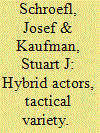

|
|
|
|
|
| Summary/Abstract |
Wars like those in Iraq and Afghanistan should be understood as hybrid wars, wars in which elements of ethnic or tribal conflict, ideologically based insurgency, factional squabbling, and organized crime are inextricably intertwined, with the same actors playing multiple and partially conflicting roles. Hybrid war is inherently transnational, featuring transnational crime networks, “migrant warriors,” transnational diaspora links, legitimate international trade, and foreign intervention. It takes place in hybridized states reliant on local warlords and other actors whose power prevents effective state-building. In this context, while counterinsurgency doctrine prescribes appropriate military strategy and tactics, the core problem is more political than military. Since a hybridized client state is not likely to be politically reformable even if a foreign ally achieves military success, outside allies like the United States should generally refrain from boots-on-the-ground intervention, pursuing instead a diplomatic solution, even though such a deal is likely to be unpalatable.
|
|
|
|
|
|
|
|
|
|
|
|
|
|
|
|
| 2 |
ID:
131429
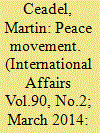

|
|
|
|
|
| Publication |
2014.
|
| Summary/Abstract |
The First World War led to the reconstruction and reinvigoration of the British peace movement, which steadily increased in activity and impact from 1914 until the end of the 1930s. This article defines the movement, explains why it emerged first and developed most influentially in Britain, and outlines the various phases of its history from the 1790s until the present day. It concentrates on the less well known phases of the movement's history: its origins during the French Revolutionary and Napoleonic Wars and on its moments of political significance during the nineteenth century. It says less about the post-1945 movement, which readers of International Affairs will be more familiar with, though it makes the point that 'peace' is currently being trumped as the primary political goal of most progressives by 'human rights', which can be invoked to justify military intervention.
|
|
|
|
|
|
|
|
|
|
|
|
|
|
|
|
| 3 |
ID:
111576
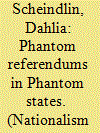

|
|
|
|
|
| Publication |
2012.
|
| Summary/Abstract |
This study examines the widespread use of referendums in entities that have declared statehood unilaterally but are not generally recognized or accepted as sovereign entities. Referendums in this situation pose a problem: to the voters, they are sufficiently a meaningful political process to warrant participation. Yet, to outsiders-including actors who may have large influence over whether the referendum's political goal can be implemented-the entire process may be meaningless. This article argues that the referendum process is not meaningless but symbolic: It fills the space between actual and desired political reality for the entities who vote. Drawing on referendum experiences in seven phantom states, the research shows that the referendums play a critical role in articulating political intentions, staking out a self-determination or sovereignty claim, displaying democratic legitimacy and forging international divisions and coalitions. Even not holding a referendum has a symbolic meaning regarding the political goals of an incomplete entity. I argue that not only can referendums signal these meanings but they can contribute to making political goals increasingly real.
|
|
|
|
|
|
|
|
|
|
|
|
|
|
|
|
| 4 |
ID:
131538
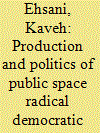

|
|
|
|
|
| Publication |
2014.
|
| Summary/Abstract |
These are critical times for democratic politics from Morocco to Iran, as heterogeneous popular movements for greater representation and social justice increasingly challenge established authorities. It is not surprising that these struggles have laid claim to symbolic urban places in the process of claiming their collective political demands. Politics is not purely discursive or institutional; it always has material and spatial dimensions, which for democratic politics is manifested through public space. For all the recent enthusiasm about the emancipating possibilities of the digital media, the fact remains that Tahrir Square (Cairo), Gezi Park (Istanbul), Revolution Street (Tehran), and Pearl Roundabout (Manama) are not virtual locations on the Internet.
|
|
|
|
|
|
|
|
|
|
|
|
|
|
|
|
| 5 |
ID:
096754
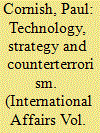

|
|
|
|
|
| Publication |
2010.
|
| Summary/Abstract |
For as long as there has been technology (the application of science and innovation) and for as long as there has been strategy (the use of forces and resources to achieve political goals) there has been a relationship of sorts between these two preoccupations. This article inquires into the nature of the technological-strategic relationship which governments, such as that in the UK, draw upon as they confront international terrorism. To what extent has the historical technostrategic dynamic remained relevant and useful, and where has new thinking been required? The article suggests that a new and more complex understanding of the technology-strategy relationship is emerging in the context of counterterrorism. The challenge facing government is to maintain a technological edge against its terrorist adversary, without exaggerating the adversary's capability, and while ensuring that its counterterrorism strategy pursues a coherent and persuasive political goal.
|
|
|
|
|
|
|
|
|
|
|
|
|
|
|
|
| 6 |
ID:
132777
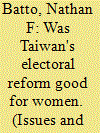

|
|
|
|
|
| Publication |
2014.
|
| Summary/Abstract |
Relative to other countries in the world, Taiwan has consistently elected large numbers of women to political office. This paper argues that women have done well in Taiwan because of the reserved female seat system in SNTV elections and that the 2005 reform from SNTV to MMM did not produce further gains in gender equality. SNTV with reserved seats produces incentives for parties to cultivate large numbers of powerful women in order to ensure that other parties are not able to win cheap or free seats. Empirically, the evidence shows that women win significantly more votes and seats in districts with reserved seats than in those without them. Moreover, winning an SNTV election requires candidates to amass power resources, and the women who survive this arduous test have power that can be used for other political goals. Women elected on party lists do not necessarily accumulate as much power. The new MMM system has arguably not produced more female legislators than the old SNTV system would have, and it has reduced the aggregate power that women in the legislature can wield.
|
|
|
|
|
|
|
|
|
|
|
|
|
|
|
|
|
|
|
|
|